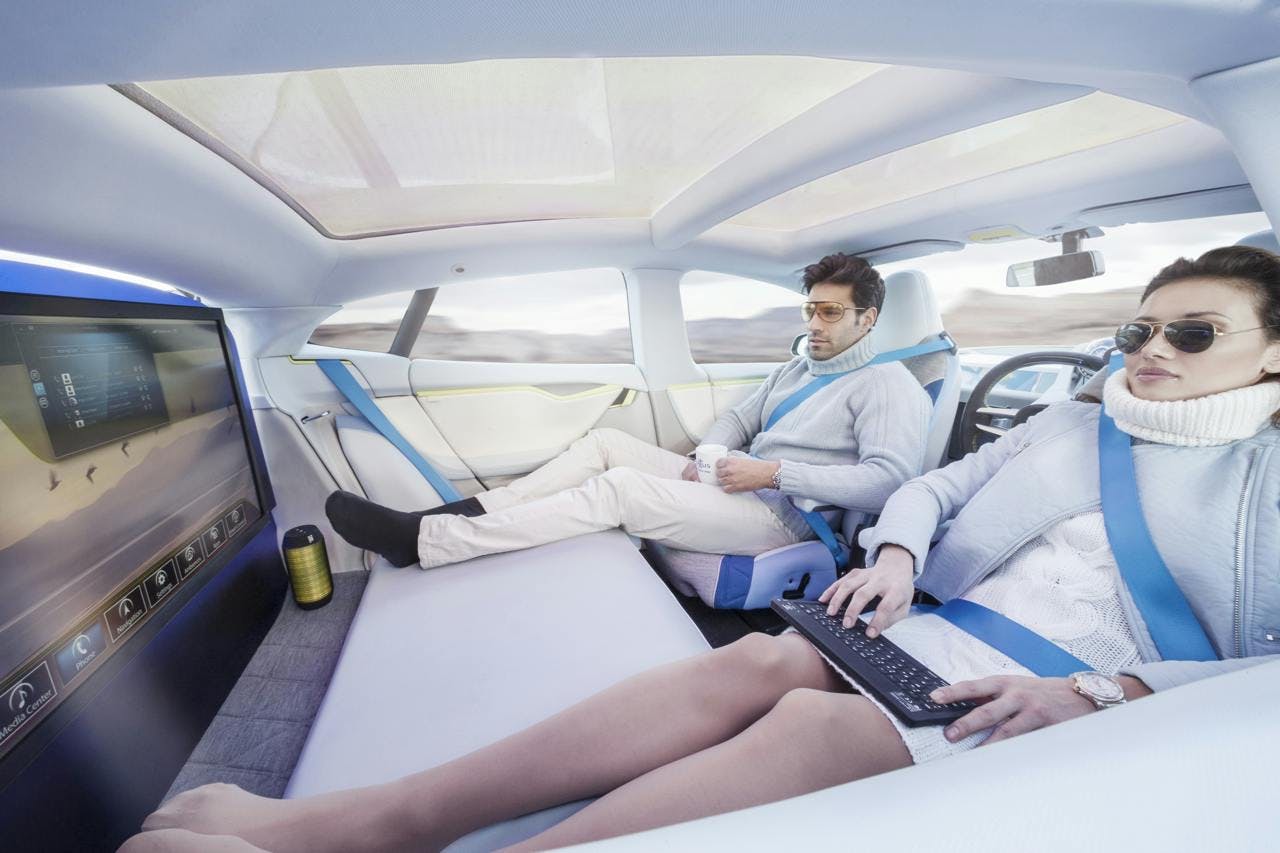Total flexibility, no commitment
A world of unique, crafted gins
Easy, free and reliable delivery

10 segments of society other than gin drinkers that will benefit from self-driving cars
Below is an excerpt from the August 2015 edition of GINNED! Magazine about Rock Rose Gin and the Dunnet Bay Distillery. Every month, Craft Gin Club Members receive a bottle of amazing small-batch gins and gin complements accompanied by GINNED! Magazine which is full of information about the gin, the distillery and loads of fascinating features.
Imagine you’ve stopped off at the Dunnet Bay Distillery to visit Martin and Claire Murray and taste their delicious gin, as we urge you to do soon. You may have found yourself so intrigued by their artisanal spirits that you couldn’t help but have a little more than a taste. When it’s time to bid adieu to the Rock Rose royals you waltz over to your car with a smile on your face as light as the gin you’ve been drinking, wave to the policeman across the way, get in your car and roll out of the distillery, regaining your route on the North Coast 500.
You’re likely anticipating the next step in this sequence: flashing police car lights, breathalyser tests, the ever-amusing walk down a straight line whilst touching your nose… But this drink driving scene is not like the others. You’re not actually driving at all. If the policeman were to pull you over, he’d find you sitting back, resting comfortably with your legs up whilst holding yet another Rock Rose G&T in your hand whilst watching a film. He would notice that your car doesn’t even have a steering wheel and that no human is needed to guide it along the road - the car is driving itself!
Does all this sound too futuristic? Well, it’s not. It’s happening right now. You might be able to visit the Dunnet Bay Distillery in your autonomous vehicle (AV) complete with car bar within the next five years.
But enjoyers of fine craft spirits are only one part of society that will benefit from self-driving cars. The technology promises to make the lives of billions of people much easier and safer whilst simultaneously disrupting industries, institutions and occupations we today take for granted. Here’s a look at 10 demographics and industries which will soon feel the impact of AVs.
CAR OWNERS & DRIVERS
Why own a car if you could always have access to one on-demand through your mobile? Currently, the car that you own is idle 95% of the time. That’s a lot of downtime for an asset that as of 2013 cost you nearly £3,500 annually in petrol, road tax, insurance and your annual Motor Ordinance Test, not to mention the cost of purchasing the car and financing your ownership. By not owning yet still having on-demand access to a vehicle, consumers could save tens of thousands of pounds every year all whilst decreasing the number of cars on the road.
Another benefit of AV’s for consumers concerns that bugbear of every motorist - traffic. A 2014 study by the Centre for Economics and Business Research showed that the average UK driver spends the equivalent of four days per year waiting in traffic, a figure estimated to grow to 18 days by 2030 and to cost the average British family £2,000. With AV’s which will all be connected to one another and work in synch, traffic jams will disappear.
THE AUTO INDUSTRY
The business model of car companies is to sell their cars to consumers. But with car ownership made redundant by AVs, how will car companies survive? A March 2015 report by global consulting firm McKinsey report estimated that one self-driving car would be needed for every two conventional cars. That immediately translates to a 50% drop in sales for car companies. It is likely that with widespread adoption of AVs, city governments will buy fleets for public transport purposes and companies that own fleets of self driving cars will emerge to offer more luxurious rides. The auto industry will likely be dealing more with these bodies rather than directly with consumers. That’s not to say that consumers will stop buying cars outright, but most, once they understand the cost benefits of not owning a car, will likely turn to on-demand services.
Another aspect of the auto industry that will be disrupted is the market for car parts and repairs, called the aftercare market, an industry worth £26 billion in the UK and estimated at about £400 billion worldwide. The huge reduction in car crashes combined with the fact that AVs will run more efficiently and require less care means that the companies in this value chain, from local auto repair shops to large auto parts manufacturers, could be made largely redundant.
LOGISTICS COMPANIES
Modern shipping and delivery is no less than incredible - you can post something in New York one morning and have it arrive at your London desk in under 24 hours. But the costs of performing such a feat are equally incredible. With AVs, one-third of the cost of overground transportation by the likes of Parcel Force or DHL - drivers - would be eliminated. What’s more, lorries could drive all night not having to stop as is currently legally mandated for drivers and AVs are much more efficient users of petrol, the cost of which makes up another third of the cost of your rapidly delivered parcel.
CHAUFFEURS AND TAXI DRIVERS
Perhaps the most obvious class of people that will be affected by AV’s are those that chauffeur us around today. According to 2013 government statistics, 297,000 taxi or private hire vehicle driver licenses had been granted in the UK and Wales. A June 2015 report by research company IBIS World showed that the UK taxi market remains diverse and significant, with over 18,000 businesses employing nearly 295,000 people with total industry revenues reaching £9 billion. However, the market is considered mature and revenues are forecast to decline from now on. With the rise of smartphone-hailed chauffeur companies the likes of Uber, professional taxi drivers have already felt the squeeze. But the reality is that even self-employed Uber drivers will become irrelevant with AVs - Uber itself announced in February that it is investing in its own fleet of self driving cars.
THE POLICE
We all look to our local police forces to keep us safe and squash out the baddies. But the reality of police work is decidedly more mundane. An article in The Conversation from March this year used statistics from the U.S. Department of Justice to show that more than half of all interaction with police forces in the United States relates to the public’s automobiles. With AV’s, today’s police work necessary for public safety from speeding violations and accidents to parking fines and routine pull-overs would disappear and with it, so could half of the nation’s police force saving local governments over $50 billion (£32.2 billion) annually with virtually zero effect on police forces’ main role, maintaining public safety.
GOVERNMENTS
If governments stand to save money by halving the number of police officers on their payroll, they also stand to lose out on all of the fines they levy from traffic and parking violations. The Royal Automobile Club Foundation found that councils in the UK made a £667 million surplus from parking violations alone from 2013-2014. In the five years to 2013, CCTV cameras in London contributed £285 to the city’s coffers by catching traffic and parking violations. At the same time, total adoption of AV’s would allow governments to eliminate the overhead needed to administrate such fines as well as the cost of court hearings related to traffic offences and even the functions at the DVLA related to issuing drivers’ licenses.
MEDIA COMPANIES
The promise of AVs will mean that people spend less time getting from point A to point B, but that time will be filled by more pleasurable activities than having to pay attention to the road whilst waiting in traffic or finding a parking spot. With ubiquitous screens and smartphones, many people will opt to use their newfound time in AVs to read the news, view programming, listen to music, chat with their friends on WhatsApp or boost their Candy Crush or favourite game’s score. To fill this time, media companies will have to churn out even more entertaining and informational content and advertisers will have more time to get their message in front of consumers. This is one of the reasons why Google is investing so much in AVs - the more time people spend on their mobile devices, the more time they’ll spend searching for things to buy on Google.
INSURANCE COMPANIES
Over the years, a number of studies of car crashes have cited human error as the cause of said crashes anywhere from 90% to 99% of the time. This prevalence of human error, the crashes themselves and the ensuing damages are the reason for which every driver that owns a car is obliged to have car insurance. Imagine if all of these accidents were eliminated, a phenomenon which would come about with total adoption of AVs. Insurance companies are worried about the potential loss of business. A March 2015 article in the Guardian noted that three major American insurance companies cited AVs as risk factors in their company filings to the Securities and Exchange Commission. Although it will take time as AVs are gradually adopted, what is likely to happen is that insurance companies will change from insuring drivers - currently a $220 billion (£141.8 billion) industry - to insuring the companies that make AV technologies in case of technological incidences.
THE ELDERLY
Despite the fact that older drivers are actually proven safer than younger drivers - 2011 saw 6% of traffic casualties caused by the 70+ crowd whilst 35% of casualties were caused by drivers under 30 which compose 20% of the driving populace - the common perception contradicts the reality. Just the same, a survey by insurance company First Central showed that those over 65 are more than 50% more likely to hail the arrival of self driving cars than their younger fellow roadsters. 35% of people over 65 polled answered that AV’s would “eliminate the difficulty they have in maintaining concentration, as well as making driving in rush-hour traffic much easier.” In comparison, only 20% of 18-24 year-olds welcomed driverless cars as the future of transport.
EMERGENCY CARE
Accident rates and traffic deaths may be declining across the Western world, but the figures remain a substantial burden on our health systems, a burden that AVs would all but eliminate. The number of road fatalities in the UK dropped by 50% from 2000-2013 and driving injuries were down 7% year-on-year in 2013 to 185,540. Despite the drop, the NHS declared in 2012 that these deaths and injuries cost it £547 million annually. In the United States, a country more reliant on its cars, over 2.5 million emergency room visits were related to automobile accidents in 2012, accidents which at over 6% of all injury-related emergency room visits are the primary cause of all injury in the country and which cost the country’s health care system £18 billion over the lifetime of those injured.







